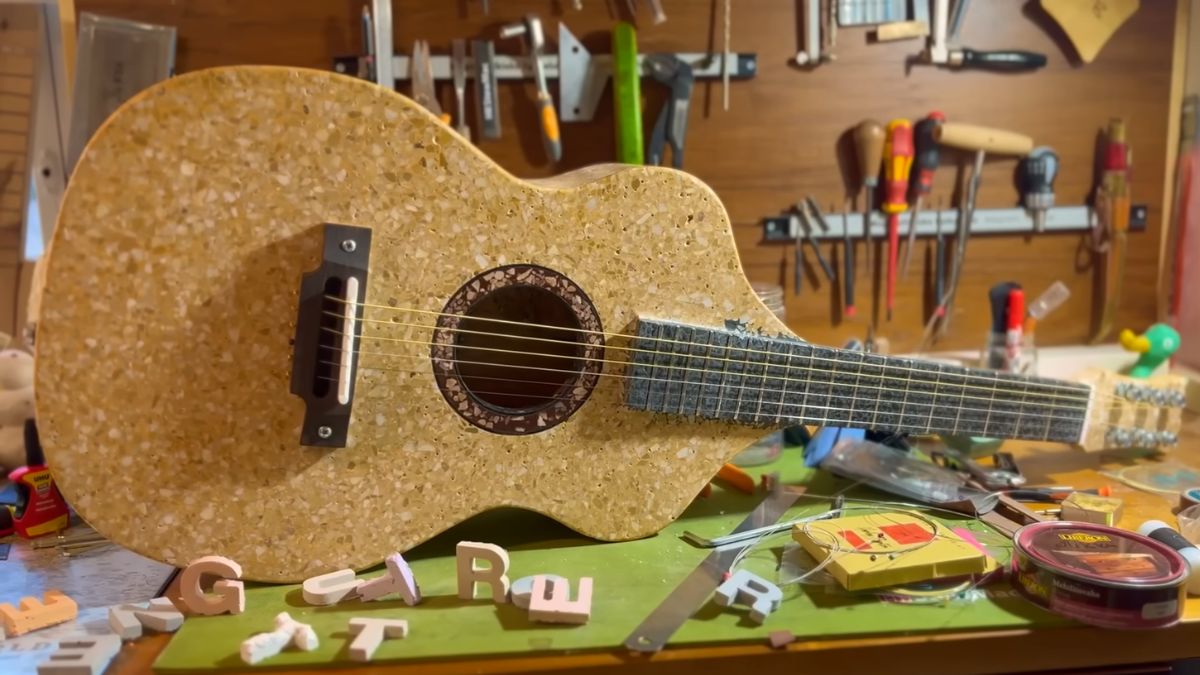Dave Mustaine Reflects on Megadeth's 'Killing Is My Business… and Business Is Good!'
“It’s the one that started it all, isn’t it?” An oral history of Megadeth's monumental debut album.
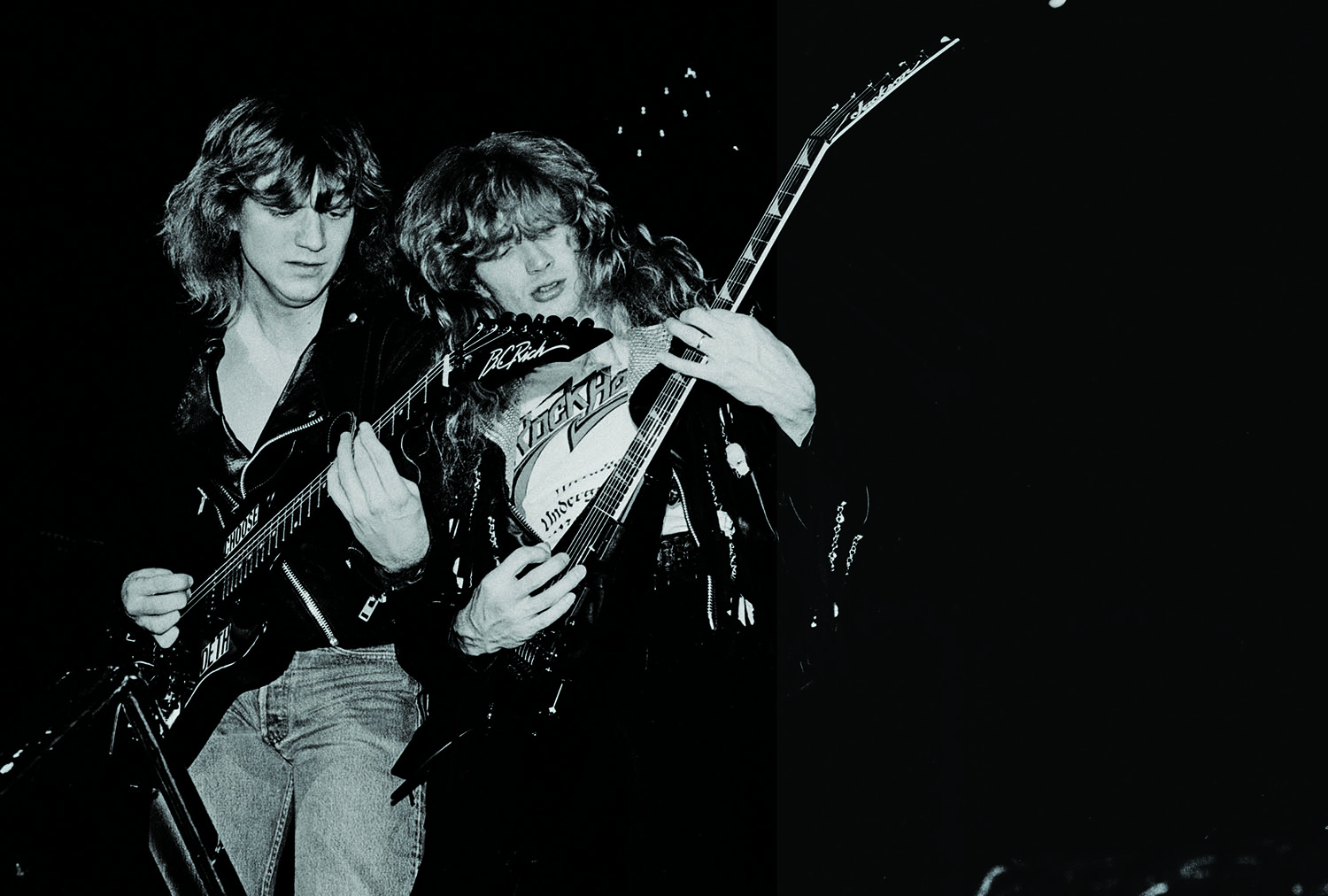
When Guitar World poses a simple, if admittedly obvious, question to Dave Mustaine—why the Mega-deth leader decided to revisit his band’s debut album, Killing Is My Business… and Business Is Good!, in a new deluxe reissue—he has a simple and obvious answer:
“It’s the one that started it all, isn’t it?”
Indeed it is. Released June 12, 1985, on the small, New York-based indie label Combat Records, Killing Is My Business announced to the metal world that there was a new player in town, and one that was arguably faster, more technically adept and straight-up crazed than any of its young peers—a not-unimpressive group that at the time included the likes of Metallica, Slayer, Anthrax and Exodus. For sure, few bands then or now combined instrumental dexterity with sheer speed and ferocity like Mega-deth, as first exemplified on Killing Is My Business. From the NWOBHM-on-amphetamines rhythms of “Chosen Ones” to the unrelenting thrash throttle of “Rattlehead,” the mudslide-down-a-mountain riffing of the title track to the all-out speed-metal madness of Mustaine’s early Metallica composition, “Mechanix,” Killing was the sound of a band playing (and, as it turned out, living) in the red, with everything cranked to 10 and pushed to the extreme.
The cast of characters was extreme as well: Mustaine, fresh off having been unceremoniously kicked out of Metallica during a trip to New York, with little to show for it but a bus ticket back to L.A. and a renewed fire in his belly; bassist David Ellefson, a recent transplant from Minnesota and Mustaine’s first recruit for his new band; Gar Samuelson, a jazzbo drummer with a blossoming heroin addiction; and guitarist Chris Poland, a similarly ferocious jazz-fusion player, who, according to Mustaine, was likewise dealing with his own substance-abuse issues. It was a combustible combination—musically and personality-wise—to be sure.
But while the music they ultimately recorded together was electrifying, Mustaine has always admitted to being less than thrilled with other aspects of Killing Is My Business, from the shoddy production to the slap-dash cover art (both of which were improved in a 2002 reissue, and which have been further refined here). On the new Century Media/Legacy Recordings release, titled Killing Is My Business… and Business is Good: The Final Kill, the now-remixed and remastered album is again joined by some extra goodies—a reworked version of the band’s cover of Nancy Sinatra’s “These Boots Are Made for Walkin’ ” (here titled “These Boots”) this time with Mustaine singing the original lyrics penned by Lee Hazelwood; Megadeth’s original three-song demo tape from 1984; and, most enticingly, seven never-before-heard live cuts from 1986 to 1990, the audio of which was culled from old VHS tapes reportedly found in Mustaine’s attic.
In the following interview, Mustaine reflects on the making of Killing Is My Business… and Business Is Good!, a period that he freely admits conjures both good and bad memories. To the latter point, the lineup heard on the album lasted through only one more effort before imploding. “I don’t think we would have survived if we didn’t separate after [1986’s] Peace Sells…But Who’s Buying?” Mustaine says. More positively, Killing Is My Business also is indicative of a moment in American heavy metal where musical boundaries were being smashed with seemingly every new release, and Mustaine and Megadeth were all too happy to be right there on the frontlines.
“When our record and [Metallica’s] Ride the Lightning and the Slayer record and the Anthrax record were all out, that was one of the coolest times to be alive,” Mustaine says. “Metal was huge and we were having so much fun. For Megadeth, that was kind of like our senior year. And Killing Is My Business was kind of like a summing up of everything about growing up for us.”
Get The Pick Newsletter
All the latest guitar news, interviews, lessons, reviews, deals and more, direct to your inbox!
When it came to revisiting Killing Is My Business… and Business is Good! for this reissue, what memories or feelings were stirred when hearing this music again?
Well, there’s still the whole scratching your head when you listen to the stuff—just thinking, Where did this come from? But it’s fun to listen to. There are great moments, and then there are also moments that are sad, where you think about some of the things we went through as a group and the constant problems with other players in the band. As enjoyable as it was, it was equally as awful because of the behavior.
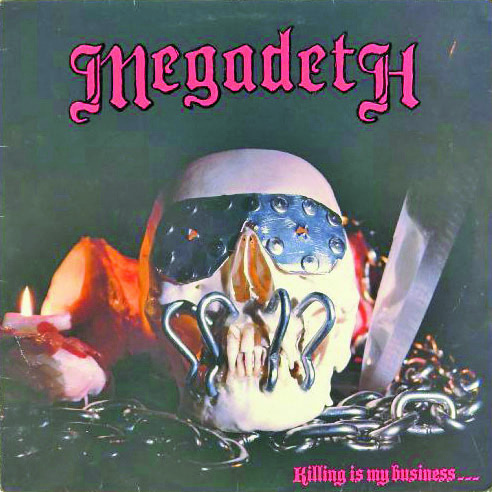
What was your attitude going in to record it?
Going into Indigo Ranch [Studios in Malibu, California] I was really excited. But we get there and [early Megadeth associate] Jay Jones and Chris Poland roll in, and half the recording budget has been spent on food and drugs. It’s very well-chronicled, and it’s been talked about for 35 years. Everybody knows that happened. We had an $8,000 budget and we commenced making a $4,000 record. I was pissed. I was absolutely pissed. Any hope of us having a relationship was shattered. From that point forward Chris Poland was just a player in a band. And Jay Jones’ time was marked.
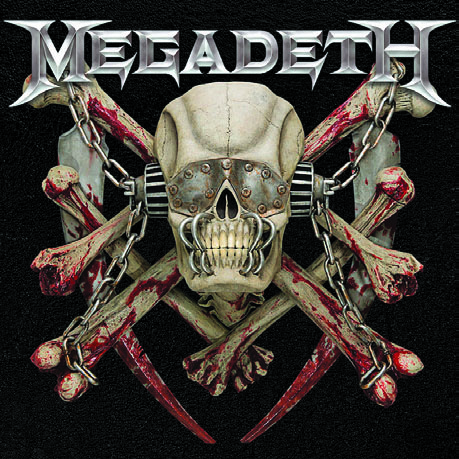
Needless to say, Chris Poland and Gar Samuelson were a bit different from you and David Ellefson in terms of their personalities and musical backgrounds. Were you skeptical as to whether the lineup would work?
Of course. And I wouldn’t say they were kind of different—they were completely different. From the way that they played to the way they believed bands were supposed to operate. The way they dressed to the things they drank to the drugs they took. All of it. You know, you don’t expect a guy to go off and get arrested right before you’re leaving on tour. And when you’re on the road, you don’t expect to have to scour the city pawn shops to collect all the guitars and cymbals and drum pieces that have been pawned.
You don’t expect that stuff. So as much as Killing Is My Business was exciting and great at that point, it’s so much more enjoyable right now because fuckin’ Poland ain’t around. And, unfortunately, Gar passed away. Gar was a very lovable guy, but, you know, he had those same things. We played in Canada one time, we were with Exciter, and Gar decided he was gonna go off to the bad side of town and try to procure some party favors. And he doesn’t come back. We have a concert to do and he doesn’t fucking come back. He eventually sauntered in halfway through Exciter’s set and we played after that. But that was my first introduction to somebody putting a substance ahead of success. And I believe that’s kind of where the first fissure happened in Megadeth’s foundation and we started to swap priorities, where music became more like a byproduct of our lifestyle.
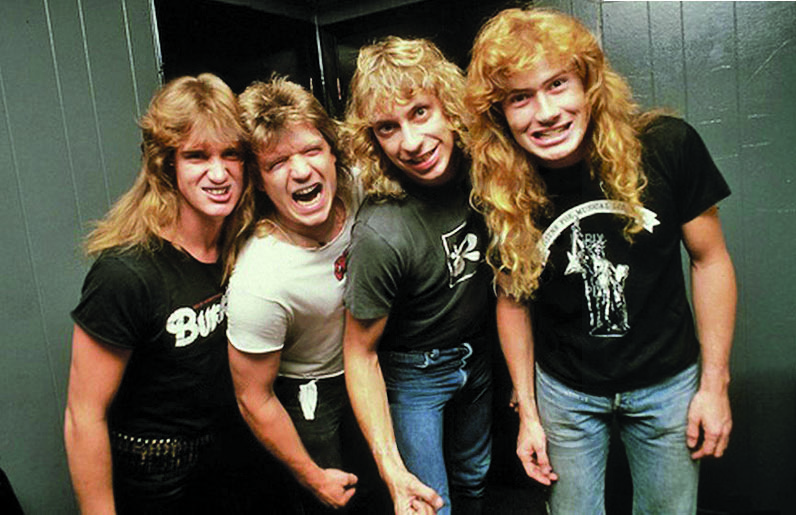
After you finished recording Killing Is My Business, what did you think when you heard the final product?
I wasn’t really pleased with it, because we had had such a small budget to make the record. And this was going to be our first shot doing something as Megadeth. And seeing as I’d already had some bad dealings out of the chute back in New York [with Metallica], I’d already started to become very skeptical. So when it came time to actually sit down with the record, I remember I was in my little apartment, and I don’t know what was more disappointing—the artwork or the way the album turned out musically. But I really didn’t know the nuances that were involved in making a record, like mastering and all that stuff. And sadly, I didn’t have the clout at the time to pull rank and say, “Look, I wanna use a better this or a better that.” And probably the most important thing was I didn’t have the experience in the studio, period, to say, “Guys, this doesn’t sound right. You have to fix this.” Now I can, because I’ve learned so much along the way.
What was your gear setup on the album?
For amps I think I was using Rocktron stuff. Then we moved up to Marshalls. As far as my guitar, when it was where I left it, it was usually the B.C. Rich Bich. [laughs] David Ellefson and I were in the habit of buying guitars from B.C. Rich, and we had a lot of them. But after a while we started to find out that there were a lot of other guitar makers that had really cool guitars as well. And sometimes when you’re out on the road and you have a guitar and something happens to it, it pretty much puts a damper on your feelings toward the whole company. So we were in Norfolk, Virginia, and I went out onstage and something happened and I thought, That’s it—I’m done. And I changed my guitar company. That was when I first ordered a Jackson. And it was weird because I went to Jackson and I said, “I want to have a 24-fret guitar.” And they said, “We don’t do that.” And I went, “You said you’re a custom shop! I want a 24-fret guitar.” And that was the beginning of the 24-fret Flying V.
David Ellefson has told a story that, prior to recording Killing Is My Business, you received a letter from a fan who said he hoped your music would be faster than Metallica’s. In response, you kicked up the bpm’s of the songs. Is this true?
I don’t remember that. It could very well be.
Regardless, Killing Is My Business is a very fast record. Were you trying to make everything as fast as possible?
No, actually. We weren’t setting out to do that. I think that would have been a bit predictable. For the most part the songs were written, and then, yeah, we would adjust them to the point where they were as fast as possible. But then we’d settle them back a bit into the pocket. So you’d take a song to a point where you’d gone as far as you can possibly could and then just kind of bring it back in. Because I think when you have a great riff, there’s probably a window of about 10 beats per minute that you can experiment in. You can go a little above or a little below. But if you get too far off, the hook will go and it won’t come back.
What were some of the subjects you were tackling lyrically?
Well, a lot of people think, “Oh, all the songs are about the devil.” They’re not. I listen to it, and some of it is about the occult. But some of it’s about stuff that’s 100 miles away from that. Like “Killing Is My Business,” the title track, is about a guy who’s hired to do something, and he’s been hired to do the same thing to his employer. I loved watching movies and stuff like that, but I don’t ever remember watching a movie where something like that happened.
Let’s talk about the live tracks that are included in the new package. It’s so cool to hear audio of such early performances. These were things you found on VHS tapes in your attic?
Yeah, the audio was from the tapes. And those were tapes we started collecting a very long time ago. We were going to make a project called These Boots that would have live songs from the latest lineup going all the way back to the first lineup. And the idea was to use whatever was the best version of the song, whether or not it was from the lineup that recorded it. So we had a whole bunch of different takes of a lot of different songs, and that was the whole premise. We were going to release every single song, if we could, and have this live anthology kind of thing.
What was your first impression upon hearing these performances from 30 years ago?
My impression was, “Wow, what was I thinking?” These songs, the progressions, and just the way the performances are…to me, looking back, it was highly energetic. And it was fun to play. You know, I don’t like doing stuff that’s difficult just for the sake of it being difficult. I’m not that guy. I don’t write stuff just to fuck with people. It’s whatever the song calls for.
How would you say the four of you—David, Chris, Gar and yourself—played together as a unit onstage?
There were good days and there were bad days. The thing is that Chris and Gar were so talented that, when they were on, you were literally watching something that was a sight to behold. But if they weren’t both on, you had one guy that was phenomenal and one that was mediocre, and it kind of showed. And the other thing was that those guys were so much farther along in their playing than David and I. So if one of the two of us wasn’t on, we’d just be kind of hanging on by our toenails.
At the end of the “Mechanix” performance, from a gig in Denver in 1986, you say into the microphone, “You’d better show up backstage or you’re dead meat.” Was there a fight going on?
[laughs] I have no idea. I was probably playing with a heckler in the audience.
You also make a comment at the end of “Chosen Ones,” from that same show, about the crowd being hospitable because they’re throwing drugs at you.
That’s hilarious. Yeah, the crowds would do that. There were a couple places we’d play where they would throw marijuana, there were a couple places where they would throw bindles that had powder in them.
Then you go on to introduce a new song, “Bad Omen,” which would appear on your next album, Peace Sells…But Who’s Buying? So even as you were touring for Killing Is My Business you were getting ready for the next phase of the band. How did Killing Is My Business set up what was to come?
Very nicely! [laughs] But you know, I can’t even imagine trying to do nowadays what we did with Peace Sells piggybacking on Killing. Because we went on tour for Killing for 72 weeks, and then we had Peace Sells pretty much buttoned up by the time we went into the studio. And that album was done right. We went into a studio in Los Angeles and hammered it out.
Can you talk a bit about what’s going on with Megadeth now? Are you guys working on new material?
Yes, actually, we are. We have been for a few weeks now. All the band members are at home writing stuff and putting it in the same spot, keeping all the riffs centralized in one place. And anybody can access anybody’s stuff. And then once we’re done I’ll start assembling everything.
So, will we see new Megadeth music in 2019?
Absolutely. For sure. A whole new record, I would say the chances are probably 95 percent. And at least one new song, I’d say it’s 100 percent. No question.
Rich is the co-author of the best-selling Nöthin' But a Good Time: The Uncensored History of the '80s Hard Rock Explosion. He is also a recording and performing musician, and a former editor of Guitar World magazine and executive editor of Guitar Aficionado magazine. He has authored several additional books, among them Kurt Cobain: Montage of Heck, the companion to the documentary of the same name.
“There’d been three-minute solos, which were just ridiculous – and knackering to play live!” Stoner-doom merchants Sergeant Thunderhoof may have toned down the self-indulgence, but their 10-minute epics still get medieval on your eardrums
“There’s a slight latency in there. You can’t be super-accurate”: Yngwie Malmsteen names the guitar picks that don’t work for shred

